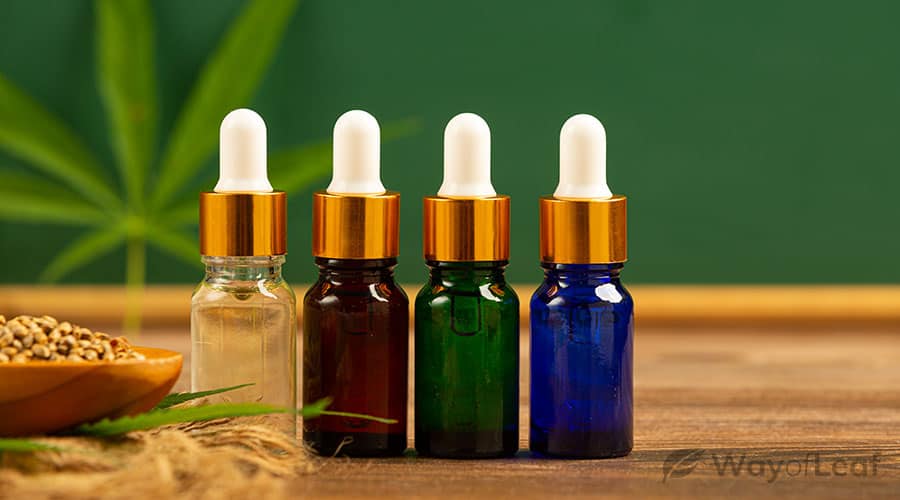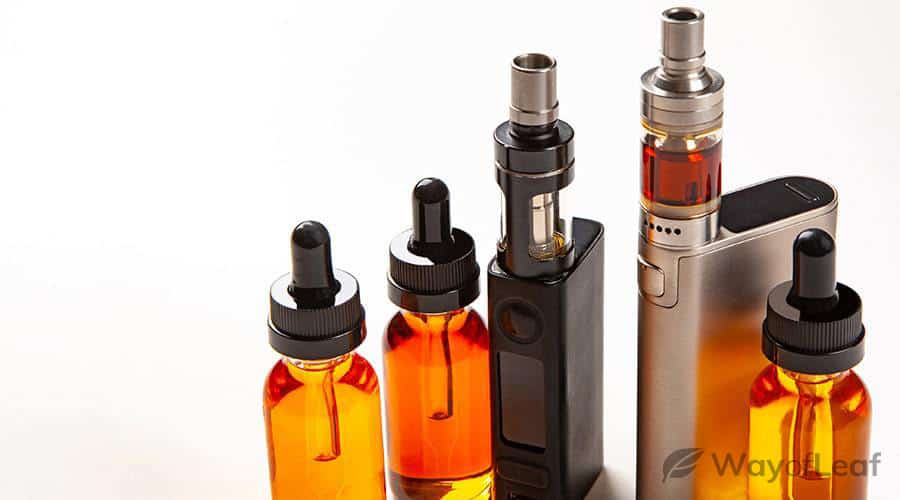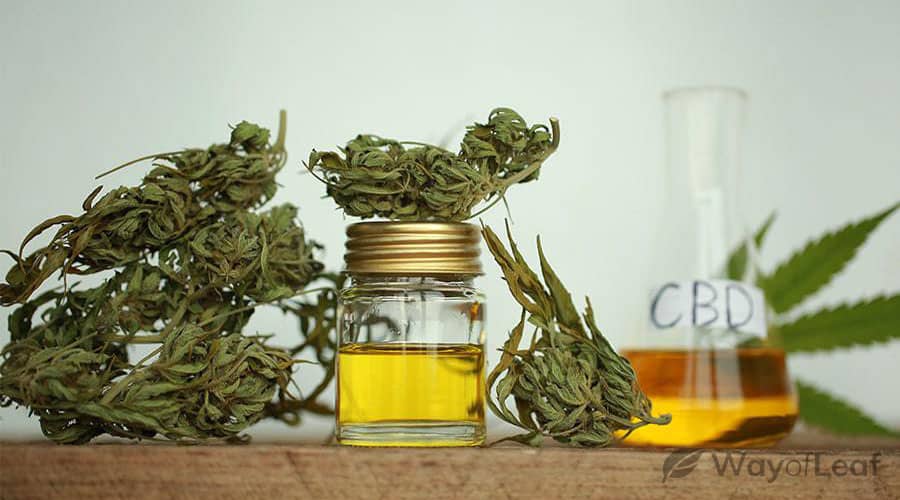Proponents of CBD oil suggest it can help with chronic pain, depression, anxiety, and more. Whether CBD provides relief from a range of debilitating conditions, like those mentioned above, is an open question. And while there is some research to back up these assertions, there isn’t enough of it to satisfy the FDA.
At present, the FDA does not approve the use of CBD. However, the agency has approved Epidiolex, a drug for epilepsy that contains CBD. Presumably, the FDA wants even more evidence regarding CBD’s efficacy and safety profile.
In any case, the popular cannabinoid is subject to a broad range of theories and suppositions. Some are true; others are nonsense. In this article, we investigate the latter in the form of ten major CBD myths.
The Truth About CBD Oil
CBD oil is the wellness product of the decade. From supermarkets to drug stores, it has become commonplace in almost every commercial sphere.

The cannabinoid, CBD, is just one compound found naturally in hemp. It was initially discovered and isolated from the Cannabis sativa L. plant in 1940 by Roger Adams, an American organic chemist.
Over the last few decades, researchers have discovered invaluable knowledge about CBD and its medical potential.
Over the last few decades, researchers have discovered invaluable knowledge about how the compound is chemically structured, how it impacts the human body, and its medical potential. Let’s explore some of the truths about CBD.
Truth or Myth: Side Effects Can Occur With Some Kinds of CBD
True. Some users may experience nausea, diarrhea, and dry mouth after consuming too much CBD if they have a low tolerance. However, side effects tend to be mild and aren’t more dangerous than overusing a common supplement like magnesium. To avoid any unwanted side effects, follow the serving sizes recommended by each product or brand. Additionally, if you’re a new user, it’s better to start with a less potent product and a lower dose of it.
Truth or Myth: CBD Has Been Used in Some Traditional Forms of Medicine
True. Although CBD was first isolated in the 1940s, communities have been using hemp for thousands of years. Some evidence suggests that the plant was first used medicinally around 400 AD in modern-day Romania. However, researchers still speculate about its importance. As the crop would have been cultivated as full-spectrum cannabis, it’s also likely that many of the plant’s more noticeable effects would have been from its THC content.
Truth or Myth: CBD isn’t addictive
True. Scientific evidence, while limited, shows CBD to be non-addictive. However, many people often believe it is because the compound’s counterpart, THC, can encourage dependence. In fact, some research shows that CBD has the potential to tackle other forms of addiction, like tobacco use – although many of these studies are in preliminary phases.
Truth or Myth: CBD Is Non-Intoxicating (Meaning It Doesn’t Cause a High)
True. Unlike the compound THC, CBD does not cause an intoxicating high. However, it is psychoactive, meaning it can have an effect on one’s psyche, for example, encouraging feelings of relaxation and wellbeing. In the U.S., there are strict regulations surrounding THC levels in CBD products. In states without a medical marijuana program, brands can only sell products with less than 0.3% THC.
Myths About CBD Oil
Like any new healthcare product, many wild myths and misconceptions surround CBD. This isn’t surprising considering that research into CBD is still very much ongoing, especially when it comes to its medical value.
Additionally, its popularity has grown at an unprecedented rate. Many brands and manufacturers are often competing with each other to produce new and unique CBD formulations.
This can create a lot of confusion about the compound. For instance, what’s the difference between broad and full-spectrum CBD oils?
As the market grows, this confusion can turn into misinformation. So, during this article, we’ll break down the 10 biggest myths and truths about CBD oil.
Myth #1: It’s a Miracle Cure
The ‘miracle cure’ assertion is perhaps the most significant myth surrounding CBD oil and cannabis in general. There is a BIG difference between aiding with symptoms and curing a medical condition. Perpetuating ideas like CBD curing diabetes, multiple sclerosis, or any other kind of chronic disease is extremely dangerous.
However, some scientific evidence shows CBD oil can manage the symptoms of many different medical issues. These include psychological conditions and mood disorders, chronic pain, neuropathy, and even symptoms of diabetes. In summation, CBD could offer excellent relief from the onset of symptoms. However, it is certainly not a miracle cure for these conditions.
Clinical research exploring CBD’s benefits is still in progress but many testimonials offer positive news.
One of the main physiological functions of CBD oil within the human body is its role as an immune response regulator. At present, no clinical trials show the cannabinoid’s ability to reverse a specific condition. However, anything that works to enhance the efficiency of the immune system may help defend the body, in theory.
While clinical research exploring CBD’s benefits is still in progress, many testimonials offer positive news. For instance, anecdotal reports claim that CBD could be useful for sleep management and stress relief, amongst other things.
Myth #2: Little Research Has Been Done on CBD Since It’s a Schedule 1 Narcotic
Much confusion still remains about CBD’s legality, both at federal and state levels. However, CBD oil derived from industrial hemp is not considered a schedule 1 narcotic.
In 2018, the new Farm Bill was signed and approved, making it legal for farmers across the country to grow and cultivate hemp crops. In response to this, manufacturers began producing CBD oil, which, while not explicitly legal, is generally accepted if it contains less than 0.3% THC.

Because of CBD’s popularity, a huge number of studies have been conducted on the cannabinoid, exploring topics from pain relief to autism.
Additionally, the WHO (World Health Organization) has stated that “CBD is generally well tolerated with a good safety profile.” Such a conclusive statement would only have been made with the appropriate evidence to back it up. CBD users at least know the cannabinoid is safe at the recommended dosage.
However, bear in mind that clinical studies take time. So, while there is lots of interest, research into the more serious medical claims surrounding CBD, as well as its long-term effects, is still needed.
Myth #3: CBD Oil Will Not Affect Other Medications
CBD can affect other medications. However, this isn’t particularly unusual; most chemical substances interact with each other in one way or another.
When consumed, CBD acts very similarly to grapefruit; it slows down the processing of other drugs in the body. It does this by preventing a group of liver enzymes, cytochrome P450, from breaking down the drugs in the liver.
Sometimes this can lead to toxicity, especially for drugs like Alprazolam and Dronedarone; other side effects may include sedation and even bleeding.
For those concerned about drug interactions, the best course of action is to speak with a trusted medical provider. They’ll determine whether CBD is safe to take at all or give guidance on a safe dosage.
Myth #4: All Types of CBD Are a Scam
Feelings of suspicion and curiosity are natural when any new wellness product is introduced into the marketplace. In fact, these sentiments should be encouraged so that poorly crafted or ineffective products are quickly flushed out.
However, positive consumer feedback and research have dispelled the myth of CBD being a scam.

The story of Charlotte Figi has become the figurehead of CBD acceptance. As a young girl, Charlotte experienced uncontrollable seizures as a result of Dravet syndrome. After years of ineffective treatments, her family turned to CBD. And it had life-changing consequences, reducing 300 seizures per week to 3 per month.
Influenced by this story and many others, the FDA approved Epidiolex, the first CBD-inclusive medication, which tackles persistent seizures.
Additionally, rich anecdotal evidence shows that CBD has become popular for managing everyday issues such as pain, anxiety, and sleep.
Myth #5: You Can Use All CBD Oil Types in a Vape Pen
This myth is important for a variety of reasons, namely, for the sake of your health if you ever plan on vaping CBD oil! Some people believe that you can add any liquid CBD oil into a vape pen cartridge and use it safely. However, this is far from the truth.
The reality is that CBD oils and CBD vape juices/e-liquids are two very different things. The latter is compatible with the electronic heater coils that come in your handy vape pen. Additionally, vape juice contains thinning agents such as propylene glycol (PG). A study by Lau et al., published in Pediatric Research in January 2012, showed that PG produced excessive apoptosis in the brains of developing mice.
These thinning agents make the raw liquid less viscous, so they’ll work inside a cartridge. However, several thinning agents break down over time into carcinogenic materials like formaldehyde and acetaldehyde. Despite this concern, the FDA rates PG as safe for human consumption, but much controversy still surrounds the substance.
It is up to you to decide if you want to vape. However, please note that regular CBD oil won’t work in a vape pen. It is too thick and will clog up your device.
Myth #6: CBD Turns into THC in Your Stomach
Several years ago, a pharmaceutical company released a study. It claimed that CBD oil and other CBD products could turn into THC in your stomach after ingestion. Considering that CBD is sold as a non-intoxicating substance, the CBD community became slightly paranoid from the news.
However, experts in the community soon proved that the published study was entirely inaccurate and misrepresentative. Trace amounts of THC are indeed detectable in the digestive system after the consumption of some CBD products. However, the quantity is entirely negligible as far as producing any intoxicating effects. Moreover, any detected THC is only present in the excretory system before urination.
In summation, CBD oil is non-intoxicating. It won’t magically turn into THC in your stomach after consumption! Make sure that the CBD product you use has third-party lab reports, so you can check the THC content.
Myth #7: CBD Hemp Oil and CBD Cannabis Oil are the Same Thing
The difference between hemp and cannabis can be complicated to explain. However, it’s important to understand the distinction. There are two ways to manufacture CBD oil. You can either produce it from marijuana plants or hemp plants.
For the record, cannabis is a genus of flowering plants in the Cannabaceae family. Its three species are Cannabis ruderalis, Cannabis indica, and Cannabis sativa. Marijuana and hemp are broad classifications of cannabis. These days, we simplify matters by saying ‘hemp’ is a variety of cannabis with 0.3% less THC by dry weight.
Because industrial hemp contains less than 0.3% THC, it is used to craft most CBD products on the market.
The 2018 Farm Bill permits the growth of hemp, as long as your state has a program in place. Because industrial hemp contains less than 0.3% THC, it is used to craft most CBD products on the market. Manufacturers use the plant’s leaves and flowers to extract the cannabinoid before combining it with a carrier oil like MCT.
You can also derive CBD oil from cannabis, although this is much less common. These CBD cannabis oils come from the marijuana plant rather than hemp.
Which oil is better? Ultimately, CBD is CBD, and it doesn’t matter if it comes from the hemp plant or the marijuana plant. As long as they are manufactured and processed correctly and efficiently, they both should produce similar therapeutic results. However, due to cannabis regulations, hemp-derived CBD oils are much more accessible.
Myth #8: I Took CBD Oil for a Week and Didn’t Feel Anything, so It Doesn’t Work
There’s nothing more frustrating than investing in a product that appears to have no positive effect. However, the efficacy of CBD is complicated.
Many brands suggest using oil for at least a few weeks, as some benefits or effects may not be immediately noticeable.
If users still aren’t seeing any difference, one problem could be that the oil strength is too weak. Although it’s generally recommended to begin with a smaller potency, such as 300mg or 600mg, everyone’s physiology differs. The efficacy of a CBD oil could vary depending on weight, metabolism, age, and other factors.
It’s important to note that different CBD products can affect the body differently, too. For instance, vaping CBD offers more bioavailability than other methods such as oral consumption.
Myth #9: CBD Oil (and Other CBD Products) Are Illegal
This is another popular CBD oil myth, and again it’s difficult to explain. The vast majority of CBD oils you see for sale online come from industrial hemp. The hemp plant is federally legal to cultivate in the US. As CBD oil is also produced from the (federally illegal) marijuana plant, a fair amount of uncertainty still exists.
First of all, CBD oil derived from cannabis IS illegal if you live in a state without a recreational marijuana law. If you live in a state that does permit MMJ, you can get CBD from cannabis with a valid MMJ card.
We recommend that you check out state-by-state cannabis laws. By doing this, you should find information on your state’s stance regarding CBD. In many instances, states don’t have specific CBD laws. Locations with hemp growing programs usually permit CBD sale and use, even if there is no legislation to back it up.
Myth #10: All Types of CBD Products Are the Same
CBD products come in many shapes and sizes. While it can confuse new users, consumers can choose between product type, strength, and formula.
Product strengths can range from 50mg lip balms to 5,000mg oils. Product types are also vast; most stores now sell a collection of topicals, edibles, vape liquids, pet treats, and much more. Having the choice between potency and what type of product you want to use has made CBD super accessible to different needs and routines.
Formulas can also differ; most companies choose to sell either:
- Full-spectrum: Contains a blend of all hemp’s natural compounds, including cannabinoids (CBD, CBG, CBN), terpenes, and flavonoids.
- Broad-spectrum: Contains a blend of hemp’s natural compounds but no THC.
- Isolate: Contains mostly CBD, typically 97% or higher.
Additional ingredients may also be added to a product formulation. For instance, it’s become popular to use melatonin in hemp-based sleep gummies or turmeric in products designed to relax and calm.
No matter which product you buy, always ensure it’s from a reputable brand that provides lab reports, third-party reviews, and flexible return policies.
Final Thoughts on the Top 10 CBD Oil Myths
Hopefully, this article provided useful information that readers didn’t already know or, at least, dispelled some common myths. Unfortunately, the topic of CBD can be confusing, and often that leads to misinformation surrounding its benefits and legality.
However, it’s encouraging to see more CBD research is being done, and hopefully, this will lead to a much clearer idea about the compound’s medical potential.
All in all, CBD is considered to be useful and safe when bought from a trusted company. Before purchasing a new product, always make sure to research a brand’s growing and manufacturing methods, as well as their lab reports and overall reputation.






![How Much Does Weed Cost in the UK? [Update for 2023]](https://wayofleaf.com/wp-content/uploads/2019/03/wol_1920x450-11-640x225.jpg)

![Does Weed Go Bad? [Explained]](https://wayofleaf.com/wp-content/uploads/2019/08/wol-banner-does-weed-go-bad-640x225.jpg)



